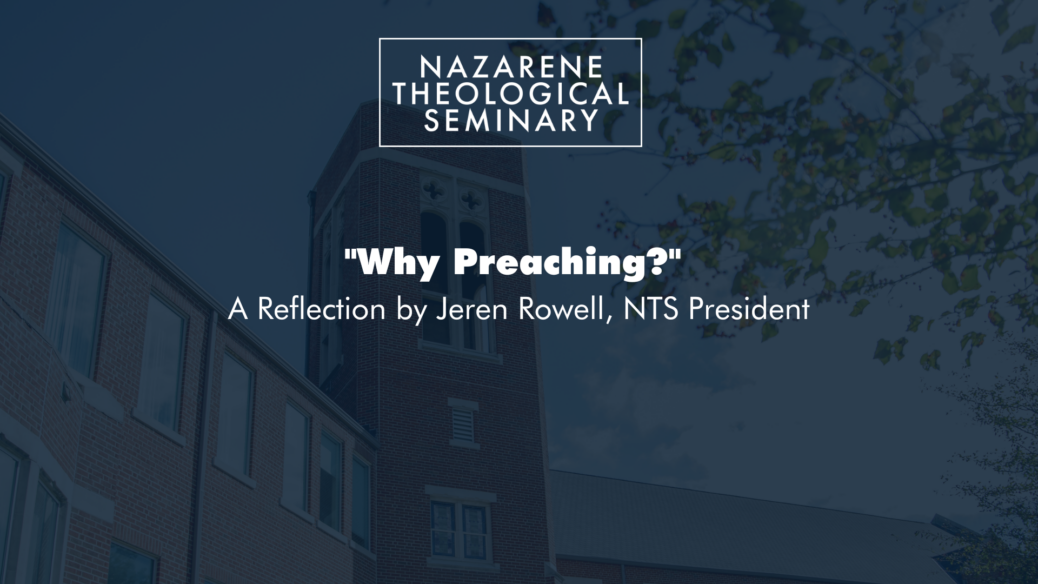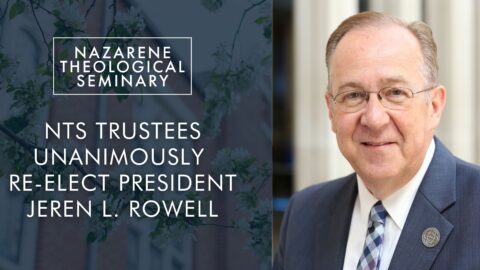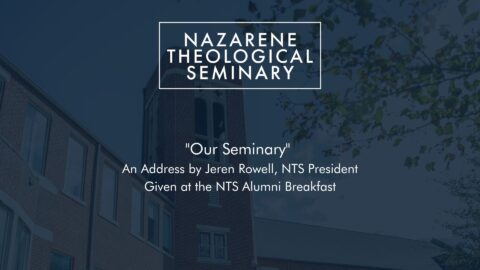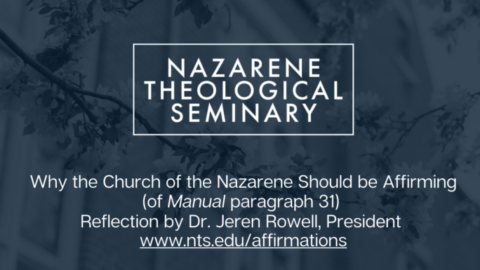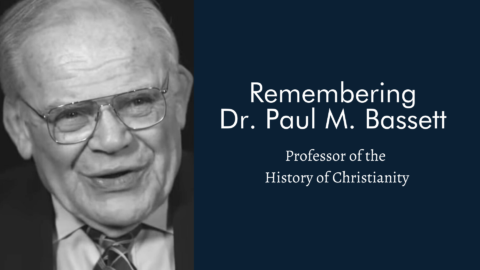The vision for Nazarene Theological Seminary was initially cast under the language, “More Preachers and Better Preachers Are Needed” (Chapman, Herald of Holiness, March 14, 1928). The pastoral task has perhaps always been understood more broadly than preaching, but there is no doubt that preaching has been at the center of our historic understanding of pastoral work. Preaching has been prominent in the curriculum of the Master of Divinity program at NTS throughout its development. Currently, a new Doctor of Ministry track in Preaching is now underway. For more than a decade now, NTS has hosted an annual Preachers’ Conference. One might think that a commitment to good preaching is unquestioned in our movement, but this is not the case.
Just recently, the place of preaching in the seminary curriculum came under question in a social media thread. The questioner (a friend) essentially asked why preaching continues to be so prominent in the seminary’s focus when congregational ministry has become so complex and requires an ever-widening array of competencies. I was glad the questioner reported back on his own research into the seminary curriculum and noted its impressive development relative to contextual complexities. Nevertheless, the question is valid, “Why preaching?”
The question reminds me of an interview I heard many years ago with Dr. Thomas G. Long, one of the great preachers and teachers of preaching during the years I was learning to preach. The interviewer, noting the barrage of media and entertainment even then, said, “People just can’t possibly be sitting there waiting to hear what I’m going to say?” I think of Dr. Long’s reply often. He said, “I think there is nothing more powerful than a person who loves other people standing under the power of the Spirit and telling the truth about something. As a matter of fact, it is so shockingly counter-cultural that it has the capacity, when done with passion, to create an attentive listener.” I agree, both from observation and from experience.
Across the twelve years I spent as district superintendent, I visited many congregations and listened to many preachers. There were times when the preaching was simply painful for its utter lack of theological substance and homiletical imagination. Most of the time, the preaching was at least faithful to the text if not rhetorically inspiring. Occasionally, however, I was blessed to sit under preaching that became, by the work of the Holy Spirit, a word from the Lord to us. What is it that enables preaching to become much more than a good speech? What is it that distinguishes a sermon from simply an interesting talk to inspired word that causes both preacher and listeners recognize it as “a word from elsewhere.”1 Adequate response to these questions requires sustained reflection and practice. This is why seminary curriculum continues to emphasize preaching and why NTS continues to provide opportunity for conferencing on the art of gospel proclamation. At the risk of oversimplification in this short space, I would offer three fundamental components that are essential to effective preaching.
First, is faithful engagement with Scripture. Biblical preaching is more than taking a text and then working to construct an inspiring talk around it. Pastors are sent to the text, in service to the congregation, seeking the word of the Lord. This clearly suggests a life of prayer and of study so that thoughtful engagement with the text, under the anointing of the Spirit, allows good news to be seen and experienced by the preacher, then announced with joy and love to one’s people. Without this kind of immersion in the Bible, we have nothing to say.
Second, is personal engagement of the preacher. Before one can proclaim a text to others, the inspired text needs to have done its work in the life of the preacher. I’ve heard many fine sermons from a technical standpoint that left hearers disengaged and uninspired. There can be multiple reasons for this, of course, but I have often found myself thinking, “Pastor, this is a fine word, but did it get inside of you in any personal way?” Again, this requires a life of prayer and sustained opportunity for the kind of thought and reflection that too easily gets set aside within the pressures of congregational ministry.
Third, is pastoral visitation. This warrants a deep conversation of its own, but I mean this in the Wesleyan sense of purposeful engagement with people of the parish toward the work of “awakening,” whereby people are convicted of their sins and of their need for God’s mercy and grace. Wesley did this not only through field preaching and class meetings but also through one-to-one conversation and correspondence, as well as house-to-house visitation. Whatever the method, the point is that the best preaching finds much of its energy in the pastoral relationships that are forged through these conversations. In our time, this may require serious rethinking about best practices for pastoral ministry.
A key challenge for contemporary pastors is that this work takes a lot of time. I fear that in the relentless press of activity and leadership expectation that is defining so much of pastoral practice these days, guarding sufficient space and time for immersion in text, skillful homiletical work, and pastoral visitation is a matter of purposeful discipline that likely requires intentional accountability. This is why our seminary continues to devote significant energy and resource to the unique task of preaching. God has chosen and continues to choose preaching as a central component of Christian witness and spiritual formation. We preach because God blesses faithful preaching. We preach because we continue to recognize the presence of the Holy Spirit in the reading, hearing, study, and proclamation of the Scriptures, pointing all in our hearing to God’s reconciling work in Jesus Christ.
Dr. Jeren Rowell
President and Professor of Pastoral Ministry
References
1 Language from Walter Brueggemann.

